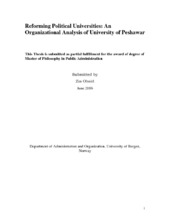Reforming Political Universities: An Organizational Analysis of University of Peshawar
Master thesis
Permanent lenke
https://hdl.handle.net/1956/2244Utgivelsesdato
2006Metadata
Vis full innførselSamlinger
- Department of Government [455]
Sammendrag
1.1 Background:In Pakistan, major source of provision of higher education are public sector universities. They are controlled by the Ministry of Education, Ministry of Science and Technology and Higher Education Commission (previously University Grants Commission). The governance and managerial structures of the universities is a legacy of the colonial past. The governance structures and positions are modelled on public sector British universities. The positions of the Chancellor, the Vice Chancellor, the Registrar and decision making bodies like the Syndicate and the Senate are some of the examples of this replication.In 2001, the Government of Pakistan initiated a process of reforms in the higher education sector. The President of Pakistan formed a task force with a mandate to analyze the current condition of the higher education sector and to recommend necessary changes. Objectives assigned to the task force were, “to review higher education in Pakistan and recommend ways of improving qualities.” (The Task Force Report on Higher Education 2002) It submitted its recommendations in March 2002. Based on these recommendations, the Ministry of Education enacted the University Model Act. This act proposed radical changes in different areas of the universities. This included changes to the University Grants Commission, the Senate and the Syndicate. The Act also proposed changes to the rules governing personnel matters and working conditions of teachers and functional responsibilities of various administrative positions.These reforms faced a lot of opposition from various stake holders. Major resistance came from the teachers of public universities. Because of the uproar in the teachers’ community, the government restrained from implementing the whole package of reforms. They only implemented those sections, which were less controversial. For instance the establishment of the Higher Education Commission replacing University Grants Commission. It was decided to implement the rest of the package in different phases.1.2 Research Problem:This study has explored the reasons of rejection of the reforms by the teachers’ community. The reasons are explored from the organizational perspective. This implies that I analyzed the organizational aspects of public universities like structure, actors and power. These aspects helped in finding out the sources of influence within the universities.The study analyzed the organization of in Pakistan. It explored the actors who are involved in the higher education sector and their influence on the university. The reforms package was also analyzed to explore the areas of change. The analysis of these changes helped me in finding out the affect of these changes on the power holders. From the analysis of present structure and proposed changes I drew conclusions that why these changes are not accepted by the teachers of the universities.
Utgiver
The University of BergenOpphavsrett
The authorCopyright the author. All rights reserved
